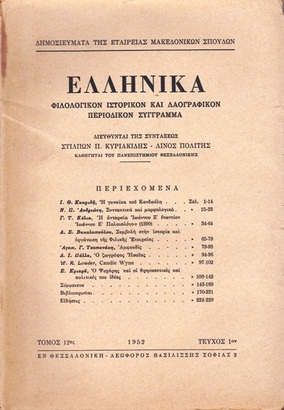Ψηφίσματα μακεδόνικων πόλεων (242 π.Χ.) και η πολιτική του Αντιγόνου Γονατά στη Νότια Ελλάδα
Part of : Ελληνικά : φιλολογικό, ιστορικό και λαογραφικό περιοδικό σύγγραμμα ; Vol.47, No.1, 1997, pages 53-61
Issue:
Pages:
53-61
Parallel Title:
Decrees by the Macedonian Cities (242 BC) and the Policy ofAntigonos Gonatas in Southern Greece
Author:
Abstract:
The well-known decrees (psephismata) passed by four Macedonian cities (Cassandreia, Pella, Amphipolis, and Philippi) in the year 242 BC dealt with the recognition of the immunity of the temple of Asklepios in Cos. This was linked directly to the policy of Antigonos Gonatas in bouthern Greece and the Greek world in general, the aim being to cement relations with the Southern Greeks, principally in political terms but also on the cultural level. Characteristic examples of this policy of the Macedonian King's are the minting of coins bearing the representation of the god Pan and the participation of the Macedonians in the Soteria Games at Delphi, which were Pan-Hellenic in nature. The points of the above-mentioned decrees which concern the present study are those where mention is made of the friendly disposition of Cos towards the Macedonian city, King Antigonos and the Macedonians. In three of these decrees, loyalty is expressed towards the King, while, at the same time, the collective (racial) conscience of the Macedonians is plainly revealed. There is an impressive departure in the case of the decree of Philippi, which has led to the conclusion that a distinction is being drawn therein between Greeks and Macedonians. It seems unlikely that the Philippians would consider themselves Greeks, thus distinguishing themselves from the Macedonians, since this would hardly sit comfortably with the general policy of Antigonos Gonatas. Even from a linguistic point of view, such an interpretation is unlikely, and the phrase must be understood by interpreting xcci as an imperative (i.e. and especially, above all). The reference to the «Greeks», however, in the phrase in the decree of Philippi still needs some particular comment, since it represents a clear departure from the phraseology of the decrees. The phrase states with greater emphasis, what is expressed less emphatically in the other three decrees: i.e. that the city of Cos has every reason to declare its wish to retain friendly relations towards the Greeks and especially towards the Macedonians. If this supposition is correct, then any distinction between Greeks and Macedonians in the decree of Philippi must be ruled out.
Subject:
Subject (LC):
Notes:
Το παρόν αποτελεί το κείμενο ανακοίνωσης που έγινε στο πλαίσιο του Γ' Διεθνούς Συνεδρίου με θέμα «Οι επιγραφές της Μακεδονίας» (Θεσσαλονίκη, Δεκέμβριος 1993). Η δημοσίευση του στον τόμο των Πρακτικών του Συνεδρίου δεν κατέστη δυνατή για λόγους ανεξάρτητους από τη θέληση μου. Ευχαριστώ ιδιαίτερα τον καθ. Ιωάννη Τουλουμάκο για την επιστημονική και ηθική υποστήριξη κατά τη σύνταξη του παρόντος άρθρου. Ιδιαίτερα χρήσιμες στάθηκαν οι συζητήσεις με τους φίλους επιγραφικούς Μ.-Η. Ζάχου-Κοντογιάννη και Α. Κοντογιάννη, καθώς και με τους κ. Ι. Τουράτσογλου, Έφορο Αρχαιοτήτων στο Νομισματικό Μουσείο Αθηνών, και Μ. Χατζόπουλο, Διευθυντή του Κ.Ε.Ρ.Α., οι οποίοι με τις υποδείξεις τους φώτισαν ορισμένες πτυχές του θέματος. Στην καλή τους διάθεση οφείλω πολλά.




